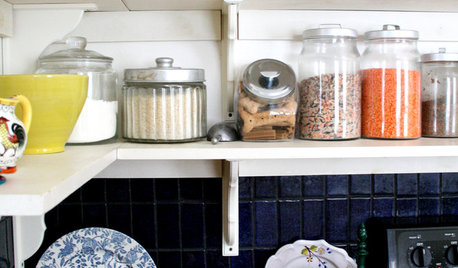How would you price dried hot peppers?
Slimy_Okra
9 years ago
Related Stories

ARTLet's Put a Price on Art: Your Guide to Art Costs and Buying
We paint you a picture of what affects an artwork's price — plus a little-known way to take home what you love when it's beyond your budget
Full Story
KITCHEN DESIGN24 Hot Ideas for Stashing Spices
Create a Mini Spice Pantry in a Wall, Drawer, Island or Gap Between Cabinets
Full Story
KITCHEN DESIGNDish-Drying Racks That Don’t Hog Counter Space
Cleverly concealed in cabinets or mounted in or above the sink, these racks cut kitchen cleanup time without creating clutter
Full Story
GARDENING FOR BUTTERFLIESGreat Design Plant: Red Yucca Spikes Dry Spots With Color
Neither heat nor cold nor lack of water fazes this flowering succulent, which adds spiky texture to Southwestern landscapes
Full Story
KITCHEN DESIGNDisplaying Kitchen Supplies — Hot or Not?
Do some kitchens just beg for a cozy row of canisters and gear for all to see? Have a look and let us know what you think
Full Story
GARDENING AND LANDSCAPING8 Ways to Beautifully Integrate an Outdoor Hot Tub
Harmonize your hot tub with your landscape for good looks and great relaxation
Full Story
KITCHEN DESIGNUsing White Marble: Hot Debate Over a Classic Beauty
Do you love perfection or patina? Here's how to see if marble's right for you
Full Story
MUDROOMSRoom of the Day: This Mudroom Is Just Plain Hot
Wait till you see what’s behind the hooks and bins in this genius family drop zone
Full Story
BASEMENTSThe Hot List: Beautified Basements
Nab function and styling ideas from the most popular basement photos on Houzz so far this year
Full Story
KITCHEN DESIGNHot Seats! 12 Great Bar Stools for All Kitchen Styles
Seek some hide, go backless, pick a swivel or a footrest — these stools let you belly up to the bar or island however you like
Full StorySponsored






randy41_1
little_minnie
Related Professionals
Windham Landscape Architects & Landscape Designers · Birmingham Landscape Architects & Landscape Designers · New Mexico Landscape Architects & Landscape Designers · Roxbury Crossing Landscape Architects & Landscape Designers · Stamford Landscape Contractors · Tempe Landscape Contractors · Aberdeen Landscape Contractors · Cedar Hill Landscape Contractors · Elmhurst Landscape Contractors · Gallatin Landscape Contractors · Newberg Landscape Contractors · Ponte Vedra Beach Landscape Contractors · Round Lake Landscape Contractors · Eastvale Solar Energy Systems · Wasco Solar Energy SystemsSlimy_OkraOriginal Author
randy41_1
Slimy_OkraOriginal Author
theripetomatofarm
sandy0225
2ajsmama
Slimy_OkraOriginal Author
theripetomatofarm
theripetomatofarm
2ajsmama
sandy0225
2ajsmama
Slimy_OkraOriginal Author
theripetomatofarm
Slimy_OkraOriginal Author
theripetomatofarm